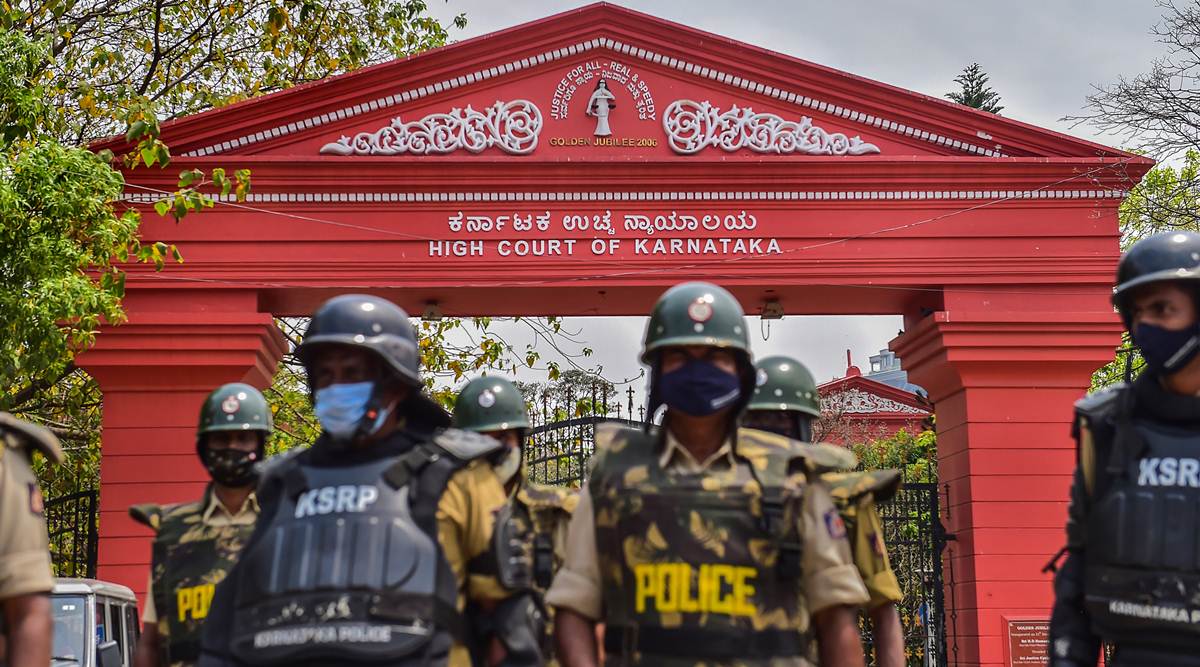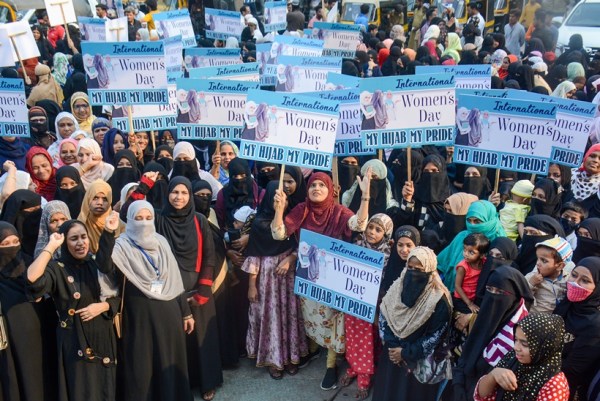 Police outside the High Court in Bengaluru on Tuesday. (PTI)
Police outside the High Court in Bengaluru on Tuesday. (PTI) STATING THAT wearing the hijab is not an essential religious practice in Islam and freedom of religion under Article 25 of the Constitution is subject to reasonable restrictions, a full bench of the Karnataka High Court on Tuesday dismissed a batch of petitions filed by Muslim girls studying in pre-university colleges in Udupi seeking the right to wear hijabs in classrooms.
The court also upheld an order issued on February 5 by the state, which suggested that wearing hijabs can be restricted in government colleges where uniforms are prescribed — and ruled that “prescription of a school uniform” is a “reasonable restriction” that is “Constitutionally permissible”.
The court asked for a “speedy and effective” police probe into the alleged role of “unseen hands” that may have been “at work to engineer social unrest and disharmony” amid protests over the hijab issue in the state last month.
Hours after the High Court delivered its 129-page judgment, a Muslim student from Karnataka approached the Supreme Court against the order, saying it had “failed to note that the right to wear a hijab comes under the ambit of ‘expression’ and is thus protected under Article 19(1)(a) of the Constitution”.
 In the wake of the hijab controversy, Muslim women holding placards take out a rally, in support of women’s right to wear ‘hijab’, on the occasion of International Women’s Day, in Thane. (PTI)
In the wake of the hijab controversy, Muslim women holding placards take out a rally, in support of women’s right to wear ‘hijab’, on the occasion of International Women’s Day, in Thane. (PTI) The student, Niba Naaz, said in her plea that the right to wear a hijab is also protected by right to conscience under Article 25 of the Constitution, which is an individual right, and that the ‘Essential Religious Practices Test’ ought not to have been applied by the High Court.
Later, six Muslim students of an Udupi government college, who were among the petitioners in the High Court, told reporters that they would not attend classes till they “get justice”. They said they felt “betrayed” by the verdict and hoped for relief from the Supreme Court before Class 12 board exams (second-year pre-university) start in the state on April 22.
“We are of the considered opinion that wearing of the hijab by Muslim women does not make up an essential religious practice in Islamic faith,” the full bench of the High Court said in the operative portion of its order that was read out by the Karnataka Chief Justice Ritu Raj Awasthi. “At the most, the practice of wearing this apparel may have something to do with culture but certainly not with religion,” the detailed order stated.
“We are of the considered opinion that the prescription of a school uniform is a reasonable restriction Constitutionally permissible, which the students cannot object to,” said the full bench also comprising Justice Krishna S Dixit and Justice J M Khazi.
“We are of the considered opinion that the government has the power to issue the impugned government order dated February 5, 2022, and no case is made out for its invalidation,” the full bench stated.
The court also ruled that no case is made out for initiating disciplinary action against government college authorities in Udupi for barring girls from attending classes with the hijab.
 Muslim students wearing hijab interact with a policewoman as they gather to protest at a government school in Bengaluru, Karnataka, Thursday, Feb. 17, 2022. (AP Photo/Aijaz Rahi)
Muslim students wearing hijab interact with a policewoman as they gather to protest at a government school in Bengaluru, Karnataka, Thursday, Feb. 17, 2022. (AP Photo/Aijaz Rahi) These key decisions were presented as answers to four questions formulated by the full bench after it took a “holistic view of the entire matter”:
* Whether wearing the hijab is part of essential religious practice in Islamic faith under Article 25 of the Constitution.
* Whether the prescription of school uniform is a violation of fundamental rights guaranteed under Article 19 (1) (a) that is freedom of expression and Article 21 that is right to privacy.
* Whether the government order dated February 5, 2022, was incompetent, arbitrary and a violation of Articles 14 and 15 of the Constitution, which guarantee the right to equality and protection against discrimination.
* Whether disciplinary action should be initiated against officials of government colleges for barring girls from attending classes with the hijab.
In the end, the High Court said it has dismissed all the writ petitions as being “devoid of merits”.
In its order, the full bench said that unlike in countries such as the US and Australia, freedom of religion under the Constitution of India is subject to reasonable restrictions.
“The First Amendment to the US Constitution confers freedoms in absolute terms and the freedoms granted are the rule, and restrictions on those freedoms are the exceptions evolved by their courts. However, the makers of our Constitution in their wisdom markedly differed from this view,” the full bench said.
“Article 25 of our Constitution begins with the restriction and further incorporates a specific provision i.e., clause (2) that in so many words saves the power of the state to regulate or restrict these freedoms,” the bench said, adding that “Articles 25 and 26…appreciably embody the limits of that freedom”.
“An extreme argument that students should be free to choose their attire in the school individually, if countenanced, would only breed indiscipline that may eventually degenerate into chaos in the campus and later in the society at large,” the order said.
Invoking the Supreme Court’s ruling on instant triple talaq, the High Court said: “Whichever be the religion, whatever is stated in the scriptures, does not become per se mandatory in a wholesale way. That is how the concept of essential religious practice is coined. If everything were to be essential to the religion logically, this very concept would not have taken birth. It is on this premise the Apex Court in Shayara Bano, proscribed the 1,400-year-old pernicious practice of triple talaq in Islam.”
The full bench also lamented the manner in which the hijab row has unfolded since December 2021. “We are dismayed as to how all of a sudden, that too in the middle of the academic term, the issue of hijab is generated and blown out of proportion by the powers that be. The way, hijab imbroglio unfolded gives scope for the argument that some ‘unseen hands’ are at work to engineer social unrest and disharmony,” it said.
The order recorded the argument of the Karnataka government that the hijab issue came up only recently on account of students “being brainwashed by some fundamentalist Muslim organisations like Popular Front of India, Campus Front of India, Jamaat-e-Islami, and Students Islamic Organization of India”.
The full bench rejected comparisons drawn by the petitioners with Centre-run Kendriya Vidyalayas where the hijab is allowed to be worn with the school uniform.
“We are not impressed by this argument. Reasons are not far to seek: firstly, such a proposal if accepted, the school uniform ceases to be uniform. There shall be two categories of girl students viz., those who wear the uniform with hijab and those who do it without. That would establish a sense of ‘social-separateness’, which is not desirable. It also offends the feel of uniformity which the dress-code is designed to bring about amongst all the students regardless of their religion and faiths,” the order stated.
“What the Kendriya Vidyalayas prescribe as uniform/ dress code is left to the policy of the Central Government. Ours being a kind of federal structure, the federal units, namely the states, need not toe the line of Centre,” the order noted.
“Young students are able to readily grasp from their immediate environment, differentiating lines of race, region, religion, language, caste, place of birth, etc. The aim of the regulation is to create a ‘safe space’ where such divisive lines should have no place and the ideals of egalitarianism should be readily apparent to all students alike,” the High Court said.
“Prescription of school dress code to the exclusion of hijab, bhagwa (saffron), or any other apparel symbolic of religion can be a step forward in the direction of emancipation and more particularly, to the access to education. It hardly needs to be stated that this does not rob off the autonomy of women or their right to education, in as much as they can wear any apparel of their choice outside the classroom,” the bench stated in its order.
The full bench started hearing the matter on February 10 after a single-judge bench referred the pleas to a larger bench saying that they involved “larger Constitutional issues”. After 11 days of hearings, the full bench reserved its judgment on February 25.
(With ENS, Delhi/ Bengaluru)
- The Indian Express website has been rated GREEN for its credibility and trustworthiness by Newsguard, a global service that rates news sources for their journalistic standards.

